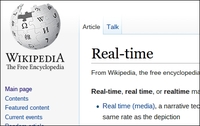Commentary
Regression To The Meaning
- by Joe Mandese @mp_joemandese, July 18, 2014

Here’s something I’ve been kicking around, and I’m hoping you can help me jump-start it. I’m thinking it’s time for a good ad technology wiki. I’m not alone. In
the past few weeks, I’ve come across others who are developing glossaries in an effort to get a handle on the torrent of terminology that clutters the technology-driven advertising and
media-buying business. The problem with glossaries, IMHO, is that they define things strictly from the point-of-view of the authority that is defining them. And if there is one thing I’ve
learned from covering advertising and media -- and the technology that is fueling them -- it is that there are many more points-of-view than most people think of.
If you think about it, that’s my job as a journalist covering this business, to listen to and filter different points-of-view about the business. One minute I’m talking to an agency honcho, the next minute I’m talking to a media supplier, then I’m interviewing a brand exec, and next I’m trying to decipher a release from some ad tech innovator whose innovation I can’t quite find the cipher for.
It actually gets worse than that, because the ad business -- even the ad technology business -- is actually comprised of many sub-businesses that follow vertical segments -- display, mobile, social, search, “traditional” media, creative, performance, workflow, you name it -- that actually come together to create a greater whole, something we call our industry. And one of the biggest problems with covering that, is that different people typically mean different things even when they are talking about the same thing. Take a term like “deal ID,” which is becoming increasingly important with the rise of private exchanges and Madison Avenue’s so-called “dark pools.” In the past several weeks that I’ve focused on trying to understand exactly how people are using deal IDs to conduct business, I’ve come up with more than a few answers.
I know that some words and terms will always have open-ended meanings, while others can serve as a lingua franca. That said, I think it’s important that there is a central place where different parts of the industry can come together to at least understand how different people are thinking differently about the same thing, even if there is no consensus for what it means. And the only way I can think of doing that is via an open source wiki. Don’t get me wrong, there are plenty of open places to get some common definitions around important, technical terms of art. Wikipedia actually has some pretty good ones up there right now. But there’s a whole spate of jargon cluttering up our inboxes -- and our minds -- that could be rendered a lot clearer if we could all come together around it.
So here I go again… I actually tried launching a MediaPost hosted wiki when I first joined this place over a decade ago, and it failed. It failed because unlike Wikipedia, we weren’t able to get enough people to interact with it to make it wiki-like. I learned it’s a lot harder to do when you operate in a world of a few hundred thousand people than when you exist in a world of everybody. That said, I’d like to give it another try, and this is my first step. It’s simply a call-to-action, a request for proposal, or any other jargony thing you want to put around it. If you have any ideas for initiating an ad technology wiki -- especially one that helps define the programmatic media ecosystem -- speak up, pipe in, make a suggestion, heck go ahead and host it. We’ll help. It doesn’t matter so much to me where it exists, I just want some place I can go to do look up what all those brain-throbbing new terms mean when I get the next press release.



Heroic Idea!
Great points, Joe. This is really important because millions of dollars and countless hours are wasted because stakeholders don't understand each other. Sometimes they don't realize it. Other times, they're too embarrassed to admit it. As a result, money is being funneled into the wrong marketing channels or simply down the drain.
Hi Joe -- A great idea. How can I help? If you like, I can ask my university to host it...what about wiki software?
Let me know what you think!
Joan VT